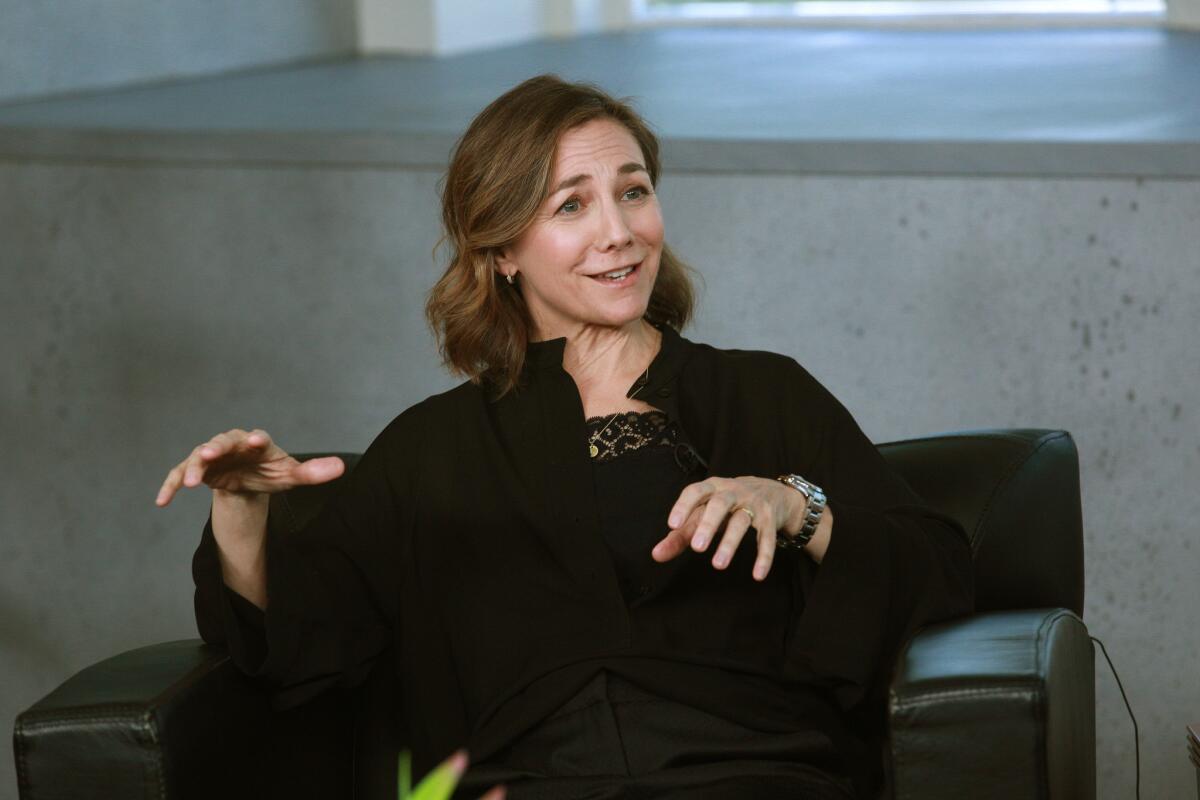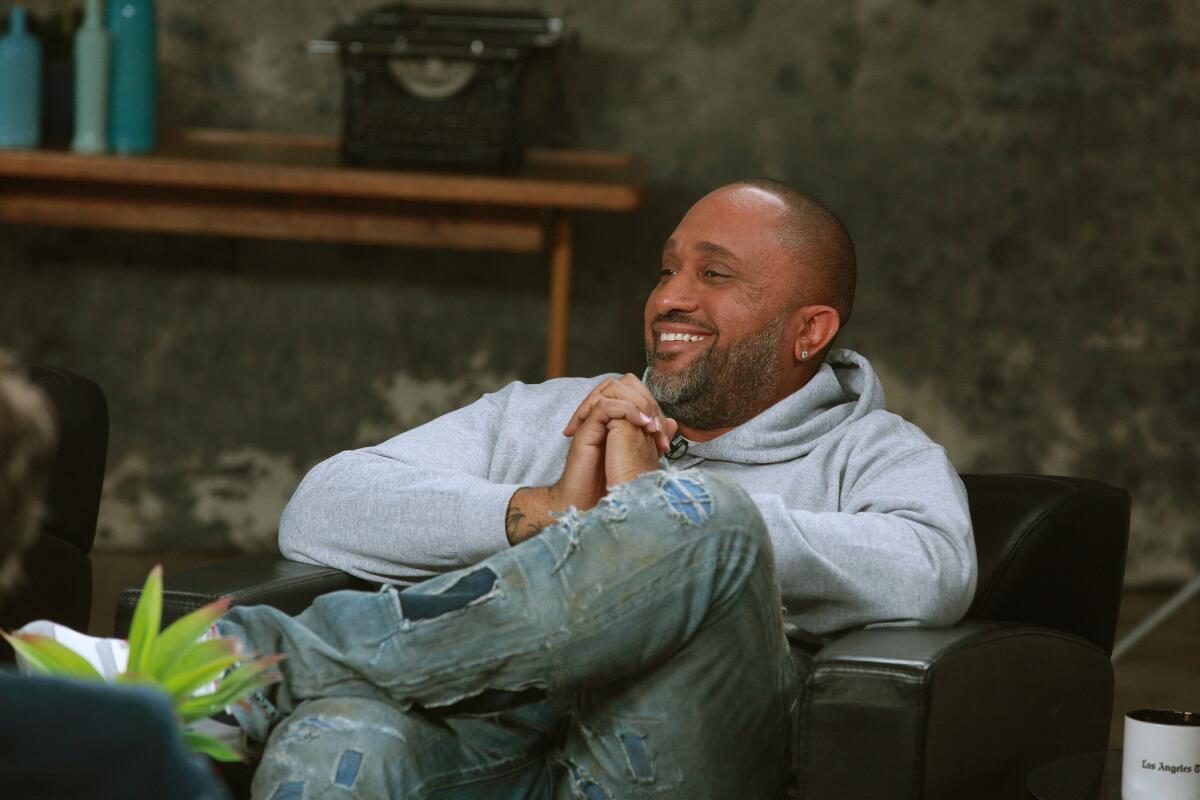How Kenya Barris, Vince Gilligan and other successful showrunners deal with their anxieties

Times writer Greg Braxton talks with show runners Noah Hawley (“Fargo”), Vince Gilligan (“Better Call Saul”), Ilene Chaiken (“Empire”), Jessica Goldberg (“The Path”) and Kenya Barris (“black-ish”) about their shows.
- Share via
The Envelope gathered some of the most distinctive and compelling voices in television to talk about their work as showrunners on groundbreaking series — series that examine social issues with a comedic twist, greed and power, betrayal and desperation, faith and trust, and violence unchecked. With Kenya Barris (“black-ish”), Ilene Chaiken (“Empire”), Vince Gilligan (“Better Call Saul”), Jessica Goldberg (“The Path”) and Noah Hawley (“Fargo”), the April conversation at The Times ventured into unexpected terrain — from network versus cable versus streaming, to the anxiety of the job, and even to the voices in their heads.
At this point most of you have had a little time with your series. Is it still fresh, still exciting?
Ilene Chaiken: Well, we’re just starting work on Season 3 of “Empire” and, yes, it’s still fresh, it’s still daunting, and we’re still figuring it out.
Does the pressure get more or less as time goes on?
Chaiken: It certainly doesn’t get less.
With “Better Call Saul,” I know there was some anxiety when you first started off. People loved it. Some anxiety with Season 2. People loved it even more. So do you get a chance to relax now?
Vince Gilligan: Is that the word? Good.
[laughter]

Vince Gilligan of “Better Call Saul” describes how anxiety helps keep the work to a certain level of quality, and Kenya Barris of “black-ish” says he hopes his show can start a conversation within the audience.
Do you relax any more as the time goes on?
Gilligan: I think I’m neurotic enough to think that if I ever were to relax — and, of course, I’m very lucky, I have my 50-50 partner in the show, Peter Gould, carrying half that showrunner weight. But I think we both have the feeling that if we were to relax, if we were to say to ourselves, “Eh, we’ve got this and people seem to be OK,” it’s not a disaster. I really think a little bit of fear or a whole lot of fear and anxiety, it wears you down, it makes your life harder than it needs to be, but it, in some sort of strange way, it also helps inoculate you from bad work. The anxiety helps keep the work to a certain level. It also probably reduces your life span....
[laughter]
Kenya Barris: I feel almost exactly the same way. We sort of paint ourselves into a good corner, but at the same time, it’s still a corner, that this show, as a comedy, has a little bit of a voice, you know, something that we do, and those stories are a little bit harder to tell. The first two seasons, I had enough of those sort of banked in my head. Now, going into the third season, there’s been some staff changes — and I love my writing staff — but there’s been some staff changes. There’s been a little bit of expectation about the voice of the show, and so the anxiety is sort of — you know, gets us pumped up. So I’m a little bit afraid.
Noah, you’re in a situation where you’ve created almost two different series under the same name. I read somewhere that you said the first bad idea was coming up with this in the first place, doing a show called “Fargo.”
Noah Hawley: Right, yeah, the first terrible idea was doing it at all.
And then the second bad idea was getting rid of everything and starting over?
Hawley: Right.

Show runner Noah Hawley of “Fargo” discusses the show’s unique writing process and reveals how notes from FX can be helpful.
So were you sitting with a blank computer at the end of the first season, trying to think of where else you could go with this?
Hawley: Luckily, with both of the years, I’ve sort of come into the homestretch with an idea for what to do next. And it always starts with a situation. You know, it’s two guys in the emergency room. One is a very civilized man and the other is the opposite, and who are those guys? And that felt like a Coen brothers premise enough to me that I could explore it. And then the second year, a woman drives home with a guy in her windshield and starts dinner for her husband. It’s like, well, who is the guy and who is the husband? So it’s always sort of started with that kind of setup. And then, what’s nice is that the end of the show is present at the beginning, you know? Because I don’t have to make it run for multiple years, and I know how it ends when I’m starting, so that everything can kind of build to that point. I like to joke that broadcast TV trained me to do this because they cancelled both of my network shows after eight or 10 episodes, so that’s just normal to me, right?
[laughter]
So even before “The Path” came on, there was already a lot of buzz because your show is the first scripted drama series for Hulu. Was there anxiety in having that sort of onus put on your show?
Jessica Goldberg: I’m an anxious person in general, so it definitely — I felt the weight of that. But all you can do is just sort of psych into the story and the work. And, you know, it’s actually been more anxiety-provoking now that the show is in the world than making the show, because then you’re just in it and trying to do the best work you can do. And I’ve definitely gone on this sort of roller coaster of it being in the world. You know, it’s a little bit like your kid out there.

It’s constantly in your head, and the day-to-day existence of being a showrunner means that your head is in a million different places, a lot of people talking
— ‘Empire’ showrunner Ilene Chaiken
To have these kinds of shows in your head, and they’re all complicated, there’s no template for anything that you guys are doing. Are these shows in your head 24 hours a day?
Chaiken: It’s constantly in your head, and the day-to-day existence of being a show runner means that your head is in a million different places, a lot of people talking to you constantly. I probably have different voices in my head, not just creatively, but just, you know, the business of my show involves different kinds of voices. Doing a broadcast show is very particular. They’re engaged in that creative conversation. I’m also, I think, the only person sitting here who’s doing a show that she didn’t create. And their voices, ideas, vision, is really important to me. And then once the show takes off, I also feel like the audience owns it, and they have a large role in kind of telling us what their show is. And the other writers and actors engage a lot. It never stops. It’s talking to you all night long in the middle of the night with, you know, the drugs we take to fall asleep and the drugs we take to stay awake.
Barris: That’s what I was thinking, I’m hearing everyone — the one thing here, there’s, like, an anxiety commonality. Like, we could play Xanax poker.
[laughter]

So Jessica, you also come from the world of network television. What kind of notes did the Hulu executives give you about what they wanted the show to be?
Goldberg: I wrote the script on spec, so I just wrote it in my house. I had been working for Jason Katims so I gave it to him and he wanted to get involved, and when we took it to Hulu, they just liked it. They were into what it was, you know? They gave a few really great notes and had me write a second episode to see sort of if it had legs in that way. But they were into what was there.
Gilligan: That makes me feel better now about signing up for Hulu to watch your show because they’re treating you right.
And FX must give you a great amount of freedom.
Hawley: Yeah, in the first year, I was also able to say to them, because I was going to write all of them myself, I said, “Give me four writers in a room for 12 weeks. We’ll break the whole thing. I’ll give you an outline — and then I’ll go and start writing.” So I ended up giving them nine outlines. It was like a 120-page document.
Barris: That you wrote?
Hawley: Yeah.
Barris: Oh, wow.
Gilligan: That’s impressive.
Hawley: And then they said, “OK, we want to schedule a three-hour meeting,” and I thought, “Oh crud, they hate it, right?” Because I’m coming out of broadcast so I had that sort of shell shock. And then literally, you know, I sat across from [FX chief] John Landgraf and for three hours he and I talked about the 120-page, nine-episode document and how the stories turned, and the themes, and the characters. And I gave him nine instead of one at a time, because it’s a lot harder [for them] to change a story once you see the whole thing.
Chaiken: Right.
Gilligan: That was smart.
How do you work that with “Empire,” where there’s not only the plots, but the characters, the injection of music.
Chaiken: Yeah, it’s a very big undertaking, and we had to create the process, especially for the music. You know, the music is part of the story, and we break it like story. And we figured out in the first season, we’re going to have to very early on identify what the musical story is in each show. And there are a couple of writers who are more conversant with music than I am, and they take on the responsibility of saying, “This is the musical story. We’re going to need this song. This is what it does from a story point of view.”

Speaking of working on shows that aren’t exactly your culture, I think it had been almost a decade since a series about an African American family had been on network television. What was the feedback?
Barris: It was a negative that I think I turned into a positive, because this tableau had not been really seen in a long time and it was sort of new territory all over again, but instead of, like, using that to cripple me, I sort of used it as my crutch, in that if notes started happening, I would say, “Well, culturally speaking, I think that…” and they really weren’t going to argue that. One, it’s autobiographical, that’s my wife’s name and the kids and all that type of stuff, it’s really based on my life. So if there were too many notes, I’d say, “Well, this actually happened to me so I think I know what this family’s doing a little bit more.” So I got away with that for a little bit — you know, the note process can be really helpful, but I was so sensitive and precious with it because I felt, like, a crazy amount of pressure that I didn’t think I would feel, because it was a show about my culture, and there were so few. But most of the time, the notes are thoughtful and they actually, you know, when incorporated in a collaborative way, make the show better.
At 500 channels, at 400 scripted shows per year, you have a real ability to democratize, there could be a show for everyone.
— ‘Better Call Saul’ show runner Vince Gilligan
There has been sort of this explosion of television just in the last two or three years, where I think John Landgraf said there’s, like, 400 scripted shows. Is this better for the industry? Is it too much? Is it just enough?
Gilligan: I think it’s great. I mean, I think systems in nature find their level or find their — I mean, they find the level at which they can sustain themselves. Television is probably no different. I think the only shame of it is, if we do have 400 TV shows but they’re all chasing the same … you know, the same 18-to-25-year-old white guy audience. At 500 channels, at 400 scripted shows per year, you have a real ability to democratize, there could be a show for everyone. There could be a show for little old ladies....
Hawley: That’s your show now.
[laughter]
Barris: The cream rises. There’s going to be some that aren’t great and some that are and some that people respond to. And I do think, what you’re saying, that the natural order of things has a way of sort of bringing itself out. And you start hearing about — I would have never found “Mr. Robot.” What channel is “Mr. Robot” on? I don’t even know, but I love it.
USA.
Barris: USA, exactly, I would have never found “Underground,” but, you know, I love it. You know, I would have never found “The Path.” But I feel like you find these things, and people start talking about it, and it kind of becomes fun.
Chaiken: I get asked sometimes, you know, how has it changed? Do you like it better now that there are so many new places to sell your show? Is it good? Is it bad? And, in truth, I don’t think about it. Writers will write, and if I have a story to tell, I’m going to fight like hell to find a place to tell it, and then I’m going to figure out the dynamics of that particular situation and organization, and I’m going to navigate them and tell my story the best way I can. And of course I’m happy if there are more buyers for my show and more opportunities, but at the end of the day, I’m going to get it done, no matter what.

Ilene Chaiken of “Empire” and Kenya Barris of “black-ish” talk about how social media affect their shows and why keeping up with the online response is increasingly necessary.
ALSO:
‘Fargo’ gets a third season order from FX
‘black-ish’ looks to get the tough issues out in the open
Q&A: ‘Empire’ show runner hopes Season 2’s will still be ‘GIF-worthy’
In ‘Better Call Saul,’ ‘Breaking Bad’s’ creators have another success on their hands
Review: Bring on the Emmys: The ‘black-ish’ episode on police brutality is an emotional ballet
greg.braxton@latimes.com
More to Read
Sign up for The Envelope
Get exclusive awards season news, in-depth interviews and columnist Glenn Whipp’s must-read analysis straight to your inbox.
You may occasionally receive promotional content from the Los Angeles Times.








